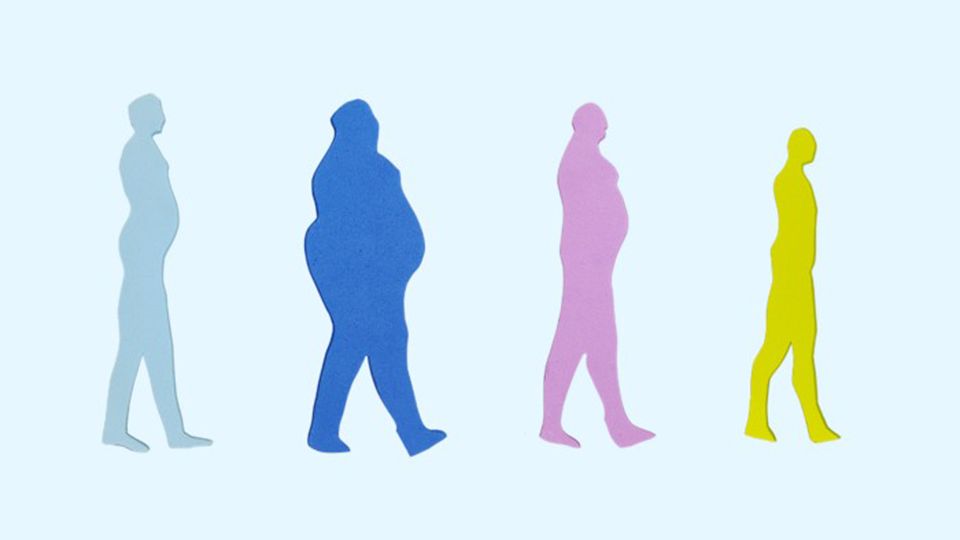Can hormones predict the possibility of weight loss?
In addition to being one of the world’s greatest killers, obesity is linked to several medical disorders. The majority of people who do succeed in losing excess weight do so only to gain it back, which frequently frustrates attempts to shed excess weight through lifestyle changes.
Understanding the complicated function that hormones play in this process may aid in the creation of effective long-term treatments for obesity.
Now that higher levels of the hormone neurotensin have been connected to greater weight loss maintenance in obese individuals, this information provides another hint as to how to rebound weight gain might be controlled.

It has long been understood that while many people who struggle with overweight or obese can lose excess weight through lifestyle changes like diet and exercise, it can be difficult for many of them to keep it off.
The World Health Organisation (WHO) views obesity as an epidemic since it causes more than 4 million deaths annually. Many of these fatalities are thought to be preventable with weight loss. For instance, it has been demonstrated that a weight loss of 5–7% can halt or delay the onset of type 2 diabetes.
Sadly, up to 80% of people who lose weight through diet and exercise gain back every bit of the weight they previously did. In the past, this weight increase has been attributed to a lack of self-control or a failure to follow weight maintenance plans.
A higher level of the hormone neurotensin may be associated with a superior capacity to maintain weight loss in obese people who have recently lost weight, according to the most recent research, which gives a fresh explanation.
Do we regain weight after weight loss?
The assumption that the body would return to a predetermined weight despite weight loss or growth has been proposed as one theory to explain why people experience rebound weight gain.
Bariatric surgeon Dr. Mir Ali of Orange Coast Medical Centre in Fountain Valley, California, who also serves as the center’s medical director, explained:
According to the set point theory, there is a weight that your body prefers to maintain at all times (within 5 to 10 pounds). This set point can be influenced by a variety of factors, including age, heredity, sex, health issues, and degree of activity. But it’s unclear what mechanisms might be at work in this observation.
The importance of hormones in hunger regulation has just recently come to light, despite the WHO reporting a rise in the number of persons with obesity starting in the 1970s. Only in 1999 was ghrelin, a hormone that promotes the desire to eat, separated and identified. Its ability to control hunger, fat storage, and energy regulation is now well documented. It also has interactions with other hormones like insulin which are important in regulating energy and storing fat.
Researchers have postulated that the fact that ghrelin levels tend to increase after weight reduction brought on by diet and exercise may be the cause of “rebound weight gain.” Contrarily, after bariatric surgery, which has a lower rate of rebound weight gain than diet and exercise-based therapies, levels of this hormone drop.
Less than 20 years ago, in 2004, researchers found that ghrelin and leptin, a hormone that controls satiety and long-term energy balance, interact. Since then, it has been shown that obese individuals have leptin resistance, which makes them less susceptible to its appetite-suppressing benefits.
looking into the neurotensin hormone
Recently, the focus has shifted to a different hormone termed neurotensin and its potential contribution to weight gain following weight reduction. The brain and intestines both generate this hormone. Previous studies have demonstrated that neurotensin levels rise following bariatric surgery, much like other hormones that control hunger and energy expenditure.
According to Dr. Gina Leinninger, an associate professor of physiology at Michigan State University who studies how the body manages its energy and how it affects obesity in people.
The possibility that neurotensin could modify body weight has drawn increasing attention. We were aware from earlier studies that neurotensin could cause animal models to eat less and move around more, two behaviors that might help them lose weight.
Higher neurotensin levels following meals may be associated with an individual’s likelihood of maintaining weight loss, according to a group of Danish researchers. In mice and obese adults, they also demonstrated a drop in neurotensin levels following weight loss.
Effects of neurotensin on preserving weight loss
8 obese mice were kept on a regular diet as controls, while 9 obese mice were placed on a calorie-restricted diet for 8 days. After the animals were put to sleep, the scientists collected samples from the duodenum, jejunum, ileum, and proximal colon to examine the levels of neurotensin expressed in those regions.
The goal of the calorie-restricted diet for mice was to promote weight loss that was comparable to what was shown in the 8-week human research.
The amounts of neurotensin in the jejunum region of the small intestine were much lower in the mice whose access to food was restricted, the researchers discovered.
The next step was to examine how a group of 42 obese patients responded to an extremely low-calorie diet plan of roughly 800 calories per day for eight weeks. Following this regimen, participants lost 12.3 kg on average. Participants underwent testing to see how their leptin, insulin, ghrelin, and neurotensin levels changed in the three hours following a meal after these 8 weeks.
For a further 52 weeks, researchers gave this group of participants instructions to eat a diet with a calorie restriction (600 fewer calories than their daily requirements).
Researchers examined data for a subcohort of participants from both groups—those who had lost over 3% weight during the maintenance period and those who had gained at least 5% of their initial weight loss—in order to examine the effect of hormones on weight loss maintenance.
After the initial 8-week weight loss phase, they discovered that those who had initially displayed a higher level of neurotensin in the three hours following a meal were more likely to have continued to lose weight during the maintenance phase.
What does this indicate for the management of obesity?
The Metabolism research is the first to link variations in circulating neurotensin to better/more sustained weight loss results in humans, and it suggests that (in the future), manipulating the neurotensin system might be helpful to support and/or optimise weight reduction. Dr. Leinninger acknowledged that there is still much to learn before that objective can be met.
In her own research, Dr. Leinninger examined the areas of the brain that neurotensin affects and if these areas are involved in the management of energy and obesity. That will be the focus of the following research steps.
How neurotensin can regulate weight and, more particularly, where in the body it acts, are the next great unanswered mysteries. We have some promising results in my lab’s investigation into how and where in the brain neurotensin can affect body weight, she said.
REFERENCES:
- https://www.medicalnewstoday.com/articles/obesity-could-a-hormone-predict-whether-people-will-be-able-to-maintain-weight-loss
- https://www.aninews.in/news/science/study-hormone-neurotensin-predicts-ablility-to-maintain-weight-loss20230411234627/
- https://www.technologynetworks.com/proteomics/news/neurotensin-hormone-predicts-ability-to-maintain-weight-loss-372025
- https://www.dtnext.in/wellbeing/2023/04/12/hormone-neurotensin-predicts-ablility-to-maintain-weight-loss
For Weight loss medications that have been suggested by doctors worldwide are available here https://mygenericpharmacy.com/index.php?therapy=20
